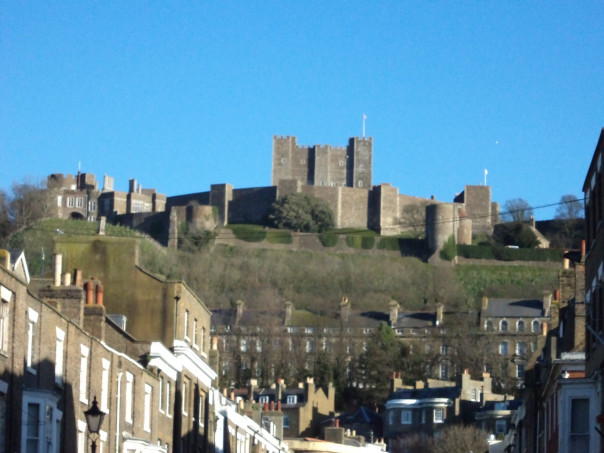Some of you may remember the NHLF-funded ‘Finding Eanswythe’ project that was run by people from History and Archaeology at CCCU with Dr Andrew Richardson: https://blogs.canterbury.ac.uk/kenthistory/st-eanswythe-found-folkestones-anglo-saxon-saint/ Well the same team of Drs Lesley Hardy, Ellie Williams and Andrew are now coming to the end of their follow-up funded project: ‘Three Days in January’. To mark this, they are holding a 1-day conference on Saturday 25 March at Canterbury Cathedral Lodge entitled ‘Translation: encounters with the sacred in objects and spaces’.
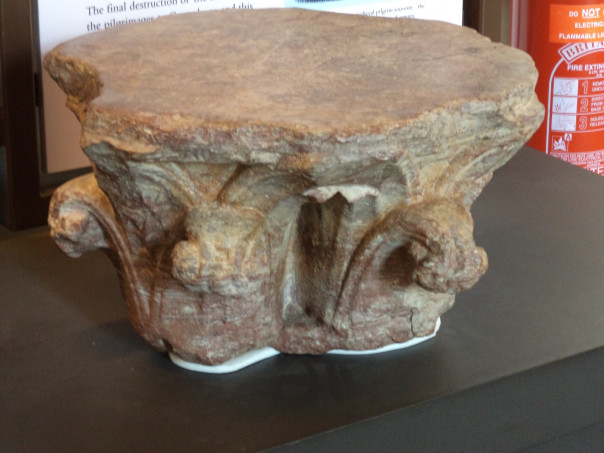
The idea is to talk further about the relationship with ancient sacred objects and to consider, in particular, how they are seen through the work of archaeology and history, so an exciting opportunity. The conference is free and for details and the booking link, please use: https://translation.eventbrite.com or contact Anna Drew: adrew@diocant.org / 07753454586.
The unseasonably warm weather has meant Drs Diane Heath and Pip Gregory, with their team of student volunteers have been able to make a start this week on the Green Dragons in Becket Garden. This has involved weeding ‘Spiro’ and adding more moss in beer soup, as well as building up the baby ‘Rocky’ dragon using chicken wire to create a framework that can be covered in hessian and then cobb mixture.
Diane and Pip’s team will also be in Canterbury Cathedral Archives on Friday (today) for the ‘Medieval Animal Heritage’ workshop on illuminated animals and their noises, but that will go in the blog next week. Instead, this week has involved a succession of meetings, including the Canterbury Christ Church ‘Sustainable Heritage Working Group’ that draws its membership from across the institution. Professor Peter Vujakovic used to chair this group even after his retirement from Geography at CCCU, but he has recently relinquished this position to Dr Jane Lovell, a Senior Lecturer in Tourism and Events Management in the Business School who specialises in the production of Light Shows. Several projects on the university campus were discussed, including John Hills’ contribution regarding the hop garden which has resulted in another successful harvest and a prize-winning ale and, of course, Diane’s Green Dragons.
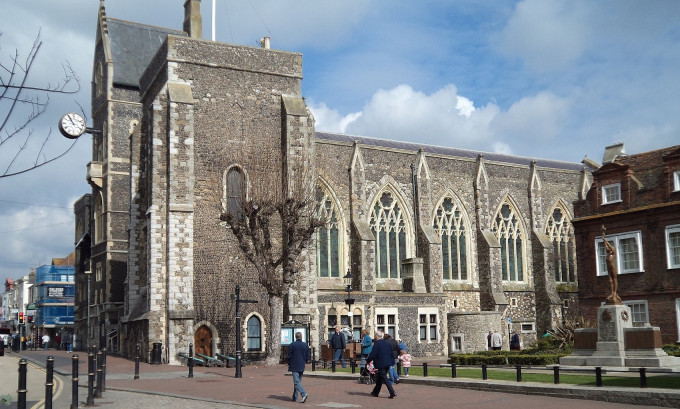
This was followed on Monday by a meeting at Dover Museum when I met up again with Jon Iveson, Dover Museums and Tourism Manager, Martin Crowther, Maison Dieu Engagement Officer, and Kieron Hoyle, who has started work on a doctoral project at CCCU on the Maison Dieu in Tudor Dover. I wanted to discuss the feasibility of working with the Maison Dieu and other organisations in the town to hold a number of free workshops in the summer at St Mary’s church for people interested in working with historical documents. This will provide a chance to explore ways of engaging with maritime communities today, a key aspect of my project with Dr Craig Lambert (University of Southampton) on ‘Kent’s Maritime Communities, c.1450-c.1640’, where such activities will be a core component of the project in 2024.
Because wills offer exciting ways of exploring aspects of the lives of local townspeople from the past, I would like to run sessions looking at such sources from the late Middle Ages. Hopefully this will appeal to people who are volunteers at the Maison Dieu and to those involved with other heritage projects, as well as members of Dover local history groups and those interested in what it was like in Dover around the time of the first Tudors. Moreover, I’m hoping this is an attractive proposition for people with no experience, as well as those with some experience, thereby offering people the chance to acquire new skills. In conjunction with the workshops, I would like to be able to hold a pop-up exhibition that focuses on several aspects of life in late medieval Dover, looking at some key occupations and the ways people engaged with their parish church. All of this is contingent on getting a small project grant through the university, so fingers crossed!!
Moving to Wednesday, in the morning it was over to Eastbridge Hospital, a gem of a medieval building in the centre of Canterbury, to discuss with Louise Knight, Clerk and Receiver at Eastbridge, several matters, including a potential postgraduate project on a late medieval manuscript, held at Corpus Christi College Cambridge that includes a ‘Life of Becket’ and how Louise and her team might enhance the visitor experience at the hospital through material culture. For objects offer a great way to explain more about the history of the hospital – how it came into being around the time of Becket’s murder, who we know was there in late medieval times and how it managed to survive the religious, political and social upheavals of the Tudors and early Stuarts. Just as an aside, Louise said the revised The Franciscan Garden since 1224 has been very well received by visitors and is selling well, which was brilliant to hear. Thus, as in Dover, this is all exceedingly exciting and such engagement with individuals, groups and organisations is an important part of the CKHH’s activities.
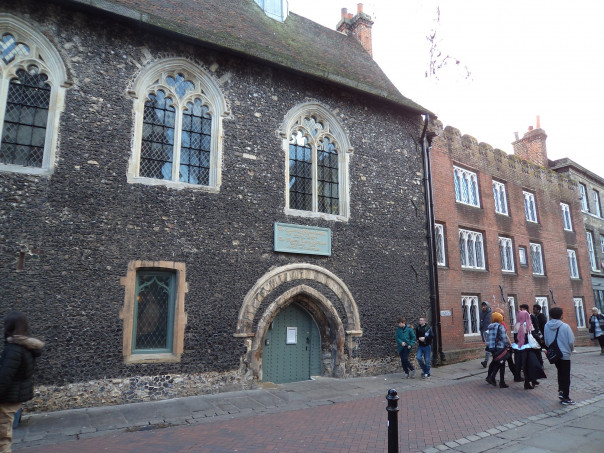
Then in the afternoon I joined other members of the St Dunstan’s Big Plan project committee, thanks Jayne for your hospitality, for a progress meeting. As the project coordinator, Dr Sarah James took us through what has been happening since November, and the answer is an exciting number of developments of various aspects of the project. In particular, Sarah focused on the growing list of contacts she has been making, especially with students from secondary and tertiary educational establishments, and for the universities this means both undergraduate and postgraduate engagement opportunities. All of this stimulated a lively discussion among the group, as did Sarah’s idea to have an annual conference on an aspect of the church and community’s history, perhaps first reprising ‘Living through the Reformation’, as well as having a series of monthly talks. Consequently, this is very much another ‘watch this space’ and we at the CKHH are delighted to be part of such initiatives.
Thursday took me to Maidstone and the Kent History and Library Centre because I wanted a get copies of more probate materials for the two sets of palaeography workshops I’m currently holding weekly, one in person and one online. In addition, it gave me the opportunity to examine a new acquisition of the Kent Archives Service, U269/O342. This manuscript is a compilation of several medieval texts relating to Dover Castle that were brought together by Edward Dering in 1630, who had them repaired, added extra leaves and had the whole bound together at a total cost of 12s.
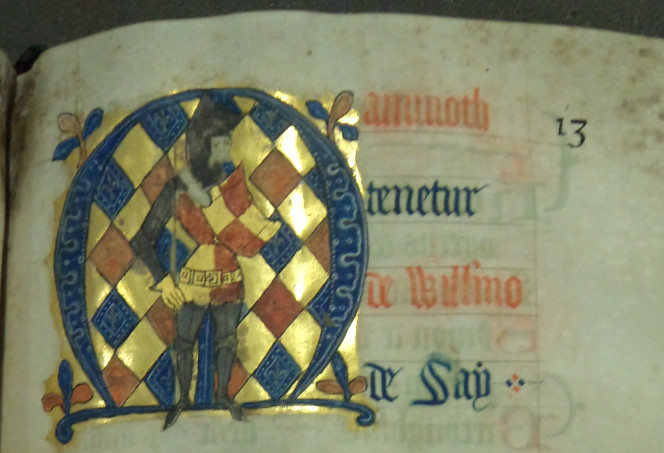
As Dr Mark Ballard says in the latest Kent Archives newsletter, “dating from about 1390, it is a compilation of texts describing the feudal obligations owing to the constable of Dover Castle, listing its wards, and the rations to be supplied to its garrison, and the ship service owed by the Cinque Ports barons in time of war. Though probably none of these texts is unique to this volume, the de luxe presentation of them reflects the constable of Dover’s increasing authority relative to the Ports through having the royal garrison and castle of Dover placed under his control.” For Mark’s full article, see: https://www.kentarchives.org.uk/wp-content/uploads/2023/01/Issue-28-Winter-2022.pdf . To mark the arrival of this manuscript into the Dering collection already in the custody of the county archives, the intention is to hold a conference later in the year to be organised by Sarah Stanley and Dr Mark Bateson from the Kent Archives Service in conjunction with Dr David Rundle at the University of Kent, and hopefully involving the CKHH as well because the custumal of Dover Castle is a fascinating manuscript.
Thus, another busy and exciting week, while looking forward to next week there is a trustees meeting of the Agricultural Museum at Brook, the next meeting of the Kent History Postgraduates, more palaeography workshops, the February joint CKHH/FCAT lecture by Dr John Williams on ‘Charlemagne and me – a personal odyssey’ on Thursday evening, and, of course, Diane Heath’s ‘Medieval Animals Heritage’.
 Centre for Kent History and Heritage
Centre for Kent History and Heritage Sheila Sweetinburgh
Sheila Sweetinburgh 966
966